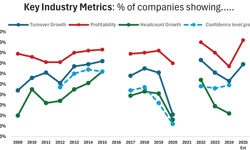Indy quits print
The Independent in an editorial in its final print edition on 26 March: "Today the presses have stopped, the ink is dry and the paper will soon crinkle no more. But as one chapter closes, another opens, and the spirit of The Independent will flourish still. Our work goes on, our mission endures, the war still rages, and the dream of our founders shall never die."
Independent editor Christian Broughton in InPublishing: “We’ve been through a painful experience. We had to close the Independent in print because we love the Independent and everything it stands for. Now we are not beholden to rolls of paper, printers and delivery times. We are far more agile. We do not have to compromise between digital and print. It was a massive decision to take. We are on the other side now while others still have that shockwave to come."
Editor Lisa Markwell in the last edition of Independent on Sunday: "Looking back over the Sindy's 26 years, the courage of its campaigns, the verve and intelligence of its reporters, the beauty of its many designs (particularly The New Review) – Britain has been lucky to have it. And from the letters and emails I've received, many of you will feel its loss keenly."
Rupert Murdoch (@rupertmurdoch) on Twitter: "Sadly UK's Independent print paper closes after about 30 years. Any loss of diversity bad."
Can serious news survive?
Alan Rusbridger in the New Statesman: "Is there an economic model for serious news? Let’s hope so – but the gales blowing through my old industry are now truly frightening. When I stepped down from the Guardian just over a year ago, my Guardian Media Group colleagues were happy to go on the record to emphasise their confidence in increasing digital revenues and a future based on growth. But something profound and alarming has been happening in recent months and all our eyes ought to be on the West Coast giants – especially, but not only, Facebook – that are cleaning up quite extraordinarily."
Michael Wolff in USA Today: "There are two clear winners in digital media, Google and Facebook, and their imperial success has largely reduced everybody else to a vassal state, living off their patronage and goodwill. This duopoly has forced the cost of advertising down and the price of traffic up, meaning, for everybody else in the advertising and traffic business, prospects shrink."
Wall Street Journal publisher and Dow Jones CEO Will Lewis, speaking at the NewsMediaWorks Future Forum in Sydney, as reported by Mumbrella: “When it comes to consuming the content that matters, people will choose healthy eating over digital junk food. Trust and confidence in our journalism, I think, is now winning. The appetite for quality journalism is as keen as ever. It is perhaps even keener as audiences find that the fare slopped out by the new entrants and aggregators pumped up on steroid-like venture capital funding isn’t quite to their taste… Journalist freedom, rather than journalism for free is what we should all be about.”
Cuts and more cuts
David Pemsel, chief executive of Guardian News & Media, announcing plans to cut costs by 20 per cent: “We need to create a confident and secure footing to then be able to be as innovative and progressive as we’ve always been. I don’t want to just pile on the ‘let’s be innovative and bravely go into this new world’ when the foundation is that fragile.”
Press Gazette on the Johnston Press job cuts: "The latest proposed job cuts at Johnston Press will mean the company’s editorial headcount has more than halved since 2009."
Roy Greenslade on MediaGuardian: "It is time to recognise that the whole UK newspaper industry is heading for a cliff fall, that tipping point when there is no hope of a reversal of fortune… Local paper publishers think it’s magic that they can produce papers on such slim staffs. I think it’s tragic because they are treating their audiences to a fake product."
The way we were
Jeremy Vine on his first day as a trainee reporter on the Coventry Evening Telegraph in 1986, as told to the Guardian: "There were 85 editorial staff and it was all manual typewriters. When it was close to deadline, and the whole office was typing, it sounded as if the room was going to take off. It was almost like hearing birdsong. For me, it was just like a dream to be turning up at work [as a journalist]. The paper had three or four editions a day. There was one called the 3pm edition and one called the late final, so the paper was almost like the equivalent of a live blog now."
Brexit
Polly Toynbee in the Guardian on Boris Johnson: "What’s plain is that Boris Johnson and the rest never had a plan. It was derelict of the media – broadcasters in particular – not to force the leavers to define what leaving meant."
The Sun’s Trevor Kavanagh on the Brexit vote in Press Gazette: “Most readers form an opinion well in advance of an event, whether it’s an election or a referendum. I think if anything it was the Remain camp and project fear which influenced people more than the Brexit campaign. I suspect that had the Remain camp delivered a more upbeat and sunny view of what life was like arguing the benefits of remaining in the European Union they would have done better.”
Former Times foreign editor Martin Fletcher on Facebook: "For 25 years our press has fed the British public a diet of distorted, mendacious and relentlessly hostile stories about the EU - and the journalist who set the tone was Boris Johnson.”
Sun editor Tony Gallagher to the Guardian after the Brexit victory: “So much for the waning power of the print media.”
Magazines
Cosmopolitan editor-in-chief Joanna Coles, who left to become Hearst's first content officer, in the New York Times: “I love Cosmo, but I gave it everything I had. I just didn’t have another sex position in me.”
Alexandra Schulman, editor of British Vogue, interviewed in InPublishing: "Four years ago, everyone was saying in two years' time, everyone will be reading magazines on their iPad. Well I never thought they would and they aren't."
Print vs web
Sir Harold Evans, interviewed in The Observer: “A good newspaper is a mosaic of attractions, and investigations are a part of that broad appeal. So far the web can’t imitate that quality of a newspaper.”
Louis C.K. quoted by Esquire: "Internet news is heroin. Newspaper news is nutrition."
Politicians vs press
Jeremy Corbyn interviewed by Vice News: "The one thing I've learned over the past six months or so is how shallow, facile and ill-informed many of the supposedly well informed major commentators in our media are, they shape a debate which is baseless and narrow."
Donald Trump, pointing at the journalists covering his rally, as reported by the New York Times: "These people are the lowest form of life, I’m telling you. They are the lowest form of humanity.”
Investigations
Business correspondent Oliver Shah, who led the way on uncovering the BHS story, on Sir Philip Green in the Sunday Times: "Later that month, he tried – and failed – to get the editor to rein in the story. 'I’m gonna call Rupert Murdoch on Monday morning because this is unacceptable,' he ranted at me. 'This has got to stop.' It did not. As I continued to dig, rival journalists on other papers expressed amazement that I was being allowed to take on Green. One gave me a front-page story on BHS. 'There’s no way my editor will let me print it, so you may as well have it,' he shrugged."
MP Keith Vaz on Sunday Mirror revelations about his private life, in a statement to BBC News: "It is deeply disturbing that a national newspaper should have paid individuals to have acted in this way."
Daily Mail in a leader: "To the public, isn’t it infinitely more troubling that the politician in charge of scrutinising policy on drugs and the vice trade – not to mention the police – is himself up to his eyes in sleaze?"
The leaker of the Panama Papers, exposing how the rich and powerful hide their wealth offshore, to German newspaper Suddeutsche Zeitung: "Hello this is John Doe, interested in data? There are a couple of conditions. My life is in danger. We will only chat over encrypted files. No meeting, ever. The choice of story is obviously up to you. I want to make these crimes public."
Launches and closures
New Day editor Alison Phillips in a press release on the new paper launched by Trinity Mirror in February: “There are many people who aren’t currently buying a newspaper, not because they have fallen out of love with newspapers as a format, but because what is currently available on the newsstand is not meeting their needs. This paper has been created as a result of customer insight and is the first newspaper designed for people’s modern lifestyles.”
Analyst Joe Rundle, head of trading at ETX Capital, quoted by CityAM after New Day folded in May: “Trinity Mirror shares are popping as investors are cheering the group’s decision to ditch New Day. This is hardly a surprise – the move was moronic in the first place… Ill-conceived, badly executed and completely foolish – it’s hard to fathom what Trinity Mirror was trying to achieve.”
CN editorial director David Helliwell on the decision to close its new newspaper for the north 24 after a month, as quoted by Press Gazette: “We were proud of the design and content and had encouraging feedback and buy-in from advertisers but unfortunately copy sales are just not high enough to justify continuing daily publication.”
Press regulation
Daily Mail in a leader: "And the Oscar for egregious hypocrisy goes to… the trouser-dropping luvvies, posturing lawyers and third-rate academics of the anti-newspaper campaign group, Hacked Off. This is the organisation, remember, founded to protect celebrities' private lives from unwarranted Press intrusion. Yet now it castigates newspapers for failing to reveal that an ex-girlfriend of John Whittingdale was a prostitute."
Culture secretary Karen Bradley in a statement to parliament on a consultation seeking views on the implementation of section 40 of the Crime and Courts Act and Part 2 of the Leveson Inquiry: "The Government is determined that a balance is struck between press freedom and the freedom of the individual. Those who are treated improperly must have redress. Likewise, politicians must not seek to muffle the press or prevent it doing legitimate work, such as holding us to account. And the police must take seriously its role in protecting not only its own reputation, but also those people it is meant to serve. This is the balance that we wish to strike, and this consultation is the most appropriate and fairest way of doing so.”
Privacy
Richard Littlejohn in the Daily Mail on the three-in-a-bed privacy injunction: "Sadly, we can’t even tell you if the olive oil involved was virgin."












